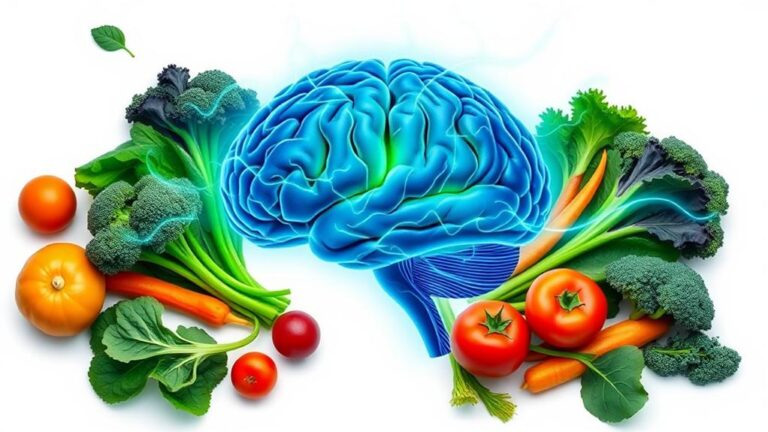Like the ancient philosophers who sought clarity in thought, you might find that a low carb diet offers a modern solution for sharpening your mind. By shifting your body's fuel source, you're not just stabilizing your energy levels; you're also potentially revealing enhanced focus and creativity. Imagine reducing those frustrating moments of brain fog, but how does this transformation actually happen? Understanding the science behind these changes could lead you to a clearer, more productive mental state.
The Science Behind Low Carb
The science behind low carb diets reveals how drastically reducing carbohydrate intake can impact brain function. When you cut back on carbs, your body shifts from relying on glucose as its primary energy source to utilizing ketones, which are produced during fat breakdown. This switch not only helps you lose weight but also alters how your brain generates energy.
Nutritional ketosis occurs when carb intake is typically limited to under 50 grams per day, promoting the body's use of fat for fuel.
Research shows that ketones provide a more stable energy supply for your brain, leading to improved mental performance. Unlike glucose, which can cause spikes and crashes, ketones offer a steady stream of fuel. This stability can help you feel more balanced throughout the day.
Additionally, a low carb diet may promote the production of brain-derived neurotrophic factor (BDNF), a protein that supports neuron growth and enhances cognitive function. By reducing your carbohydrate intake, you could also lower inflammation and oxidative stress, both known culprits in cognitive decline.
It's important to remember that everyone's body responds differently. As you explore a low carb lifestyle, pay attention to how it affects your mental clarity and overall well-being. This knowledge can empower you to make informed choices that benefit your brain health.
Enhanced Focus and Concentration
Many people experience enhanced focus and concentration when they adopt a low carb diet. By reducing your carbohydrate intake, you minimize the fluctuations in blood sugar levels that can lead to brain fog and distraction. Instead, your brain taps into fat stores for energy, which can lead to improved mental clarity and sharper thinking. This process, known as ketosis, is a key component of the ketogenic diet and can contribute to overall cognitive improvement.
When you limit carbs, your body enters a state called ketosis, where it burns fat as its primary fuel source. This process often results in a more stable cognitive function, allowing you to focus on tasks without the typical sugar crashes that can affect your productivity. You might find that your mind feels clearer, making it easier to tackle complex problems or engage in deep work.
Additionally, many people report heightened creativity and problem-solving abilities on a low carb diet. This could be due to the steady supply of energy your brain receives from ketones, allowing you to think more critically and creatively.
You'll likely notice that distractions become less of an issue, enabling you to immerse yourself fully in your work or studies. Embracing a low carb lifestyle could be your key to revealing a more focused and productive version of yourself.
Stabilized Energy Levels
Experiencing enhanced focus and concentration often goes hand in hand with stabilized energy levels on a low carb diet. When you cut back on carbs, your body shifts from burning glucose to using fat for fuel. This shift not only helps maintain consistent energy but also prevents the spikes and crashes that often accompany high-carb diets.
Here's a quick comparison of energy levels on different diets:
| Diet Type | Energy Stability | Mental Clarity |
|---|---|---|
| Low Carb | High | High |
| High Carb | Fluctuating | Moderate |
| Balanced Diet | Moderate | Moderate |
With stabilized energy levels, you'll find it easier to tackle tasks without feeling lethargic or distracted. The steady supply of energy allows you to sustain focus throughout the day, reducing the need for caffeine or sugary snacks to get through afternoon slumps. Ultimately, adopting a low carb approach can lead to more reliable energy, empowering you to remain productive and engaged in your daily activities. Embrace this change, and you'll likely notice a positive shift in your overall mental clarity.
Mood Improvement and Emotional Stability
Emotional stability often flourishes on a low carb diet, leading to noticeable mood improvements. When you reduce your carb intake, your body shifts from burning glucose to utilizing fat for fuel. This metabolic switch can greatly impact your brain chemistry, helping to regulate neurotransmitters like serotonin and dopamine, which play essential roles in mood regulation. The keto diet's advantages include potential improvement in mental clarity and focus, which can further contribute to emotional well-being.
You might find that cutting out refined sugars and high-carb foods leads to fewer mood swings and enhances your overall emotional resilience. As your body stabilizes its energy levels, you'll likely notice a decrease in irritability and anxiety. Instead of experiencing those dreaded crashes after consuming sugary snacks, you'll enjoy a more consistent energy flow throughout the day.
Additionally, a low carb diet can help balance insulin levels, which may further contribute to emotional stability. Fluctuating blood sugar levels can lead to irritability and stress; by maintaining steadier levels through a low carb approach, you can foster a calmer mindset.
In essence, adopting a low carb diet not only supports physical health but also lays the foundation for improved mood and emotional well-being, making it a powerful choice for anyone seeking greater mental clarity.
Long-term Cognitive Benefits
A low carb diet can greatly enhance long-term cognitive benefits, making it an appealing choice for anyone focused on mental performance. By reducing sugar and refined carb intake, you stabilize blood sugar levels, which can lead to improved focus and memory retention over time.
When your brain relies on ketones from fat instead of glucose, it may operate more efficiently, potentially enhancing neuroplasticity—the brain's ability to adapt and grow.
Research suggests that low carb diets might help protect against neurodegenerative diseases, such as Alzheimer's and Parkinson's. By promoting brain health and reducing inflammation, you're setting the stage for better cognitive function as you age.
Additionally, low carb diets can help you maintain a healthy weight, which is linked to better brain health.
You might also notice improved mental clarity and decision-making skills, as your cognitive resources are less compromised by energy spikes and crashes.
Conclusion
In choosing a low carb diet for mental clarity, you're not just fueling your brain; you're sharpening it like a well-honed blade. With stabilized energy levels and improved focus, your thoughts flow seamlessly, free from the fog of fluctuating blood sugar. Plus, as your mood stabilizes, you'll find creativity and problem-solving skills blossom. Embracing this lifestyle can lead to long-term cognitive benefits, making every day feel like a fresh canvas waiting for your ideas to come to life.


